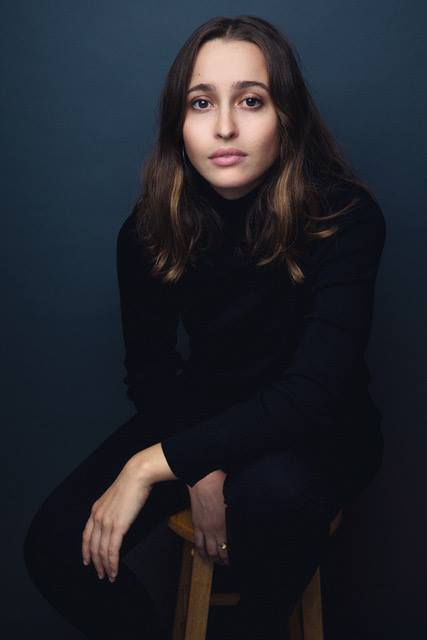Human beings are mysterious creatures: how deeply can we know even those closest to us, or ourselves? What’s the cost of knowing? In Bathsheba Doran’s 2015 play, The Mystery of Love and Sex, having its Baltimore-area premiere at Iron Crow Theatre, the four characters plumb not only matters of love and sex, but of friendship, race, religion, identity, regional differences, seeing and being seen, the impact of individual and family secrets, estrangement and reconciliation. Director Natka Bianchini and the cast succeed in embodying the script’s questions and themes in characters whose reality is palpable.

The setup of Doran’s play, especially in the first act, is that of a traditional family comedy/drama. Charlotte (Amandine Thomas) – white, Jewish, leaning on alcohol – and her lifelong best friend Jonny (Quincy Vicks) – black, Baptist, emotionally reticent – share a small apartment at their university. Charlotte’s parents Howard (Jonas David Grey) – culturally Jewish, detective novel writer, principled liberal with a host of unexamined biases – and Lucinda (Marianne Angelella) – culturally Southern, dissatisfied with her marriage, leaning on cigarettes and joints – visit for a simple meal. Amidst comic business – the play is full of funny situations and lines – the parents inquire, none too subtly, about the current nature of the younger characters’ relationship.
If only Charlotte and Jonny knew. Having grown up together since they were nine, Charlotte and Jonny find themselves asking questions the answers to which they are surprised to discover they don’t know. They love each other, so becoming lovers and partners seems inevitable to Charlotte. Later, Charlotte, over-the-top drunk, disrobes, throws herself onto the bed and challenges Jonny to have sex with her on the spot. He demurs – his Christian convictions, he says, lead him to stay a virgin until marriage. However, wait, there’s more. Charlotte admits a crush on a woman (who, alas, turns out to be a LUG – Lesbian Until Graduation). Jonny has girlfriends, none of whom he sleeps with. Where will all that take them? Where and with whom will they find the love they want and need?
In the less comic and more dramatic second act, the gulfs grow wider. Howard and Lucinda move toward divorce, as Lucinda assays a very different kind of life from what she has led. Jonny and Charlotte angrily move apart. The gaps in the relationships can seem unbridgeable. However, the course of the play ultimately moves all the characters toward compassion and forgiveness. This is a family drama, to be sure, but not the bleak sort that one would get from an Albee or Shepard.
One of the greatest joys in performance comes from vital connections among scene partners. The Iron Crow production is full of such moments. Jonny, melancholy after his mother’s death and quietly drunk, tells his deepest secrets to Charlotte. Charlotte and Lucinda share a deliberately paced scene in which Charlotte assuages her mother’s guilt about a traumatic childhood incident. Jonny and Howard confront one other, the scene crackling with their deep-seated mutual involvement even as it comes closest to its breaking point. Besides containing compelling acting, such scenes strip away layers that have concealed the characters from themselves and others, clarifying the grounding of their life decisions for themselves and the audience.

During the five years of the action, each character winds up in an entirely different place than he or she would have imagined at the beginning. The well-elucidated character arcs of Charlotte, Jonny, and Lucinda make transparent the process of how a character transforms between point A and point B. Howard’s change from the clueless and defensive fellow portrayed during the bulk of the play to a man who generously reaches out to repair frayed bonds, while gratifying, is more mysterious. Doran shows us the result but doesn’t let us see how the change proceeds.
Megan Suder’s set design is minimalist. There is a plain, monochrome backdrop, in front of which are various combinations of furniture pieces, changed, at times rather slowly, to represent different rooms, often with actors from the previous scene remaining frozen on stage until the change is complete. A tire swing, a physical tie to Charlotte’s and Jonny’s childhood, hangs at stage left. The most interesting feature of the set is a multitude of pieces of paper, hung from the ceiling of the stage. In keeping with the theme of mystery, the purpose and meaning of the papers do not become evident until close to the end of the play, at which point they become a very rich reference to how Jonny and, by implication, the other characters, are processing the changes that they undergo.
Devyn Deguzman’s sound design relies mostly on American Songbook standards for scene change music, switching to a 1960s hit, “Can’t Take My Eyes Off Of You,” for the final scene. In context, it’s less a romantic ballad than an acknowledgment of characters who at last honestly do see one another.
That final scene, emphasizing the playwright’s theme of reconciliation and the continuity of family ties notwithstanding wrenching change, could in the wrong hands seem an unrealistically emotional kumbaya moment. However, because of the way the characters have developed, it plays not as a pat conclusion but as a beginning of an ongoing loving, expansive, and affirming relationship among people whose lives have taken them in very different directions. They earn their intimacy. Likewise, well-earned will be the applause from audiences who make the top-notch decision to see this excellent production.
Running Time: Two hours and 50 minutes, with one intermission.
The Mystery of Love and Sex plays through February 3, 2019, at Iron Crow Theatre, 45 West Preston Street, Baltimore MD. For tickets, call (443) 637-2769 or purchase them online.
Costume Design by Danielle Harrow; Set Design by Megan Suder; Lighting Design by Brandi Martin; and Sound Design by Devyn Deguzman.




